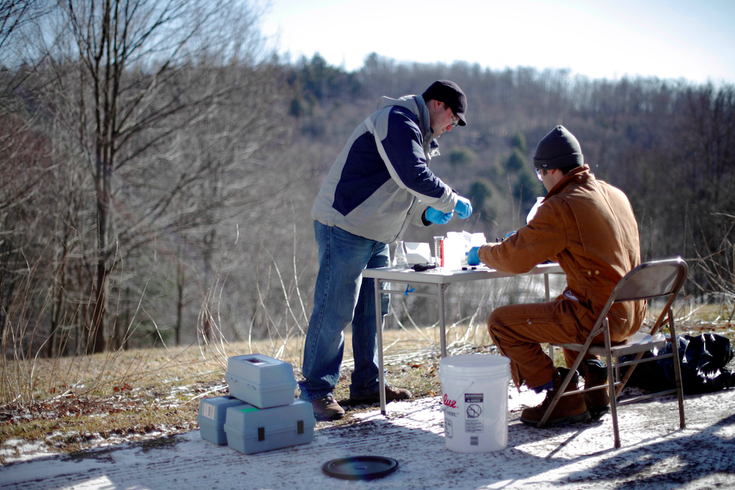
March 10, 2016
 Matt Rourke/AP
Matt Rourke/AP
n this, Feb. 13, 2012 file photo, Dan Jacobsen, center, and Joel Munson with TechLaw, contractors for the Environmental Protection Agency, conduct a field screening of a homeowners water in Dimock, Pa. The U.S. Environmental Protection Agency has completed testing at 61 homes in Dimock, where a gas driller is blamed by some residents and anti-drilling groups for polluting the aquifer. EPA says the test results do not show unsafe levels of well-water contamination.
Two couples from Dimock Township in northeastern Pennsylvania have been awarded $4.24 million after a federal jury reached a verdict Thursday in a lawsuit against Houston-based Cabot Oil & Gas Corp, which stood accused of polluting well water as a result of its natural gas drilling projects.
Dimock has previously been a lightning rod in debates about fracking, featuring prominently in the Emmy-winning 2010 documentary 'Gasland' and serving as the site of a highly publicized battle over methane contamination during the early years of Pennsylvania's natural gas boom.
In 2009, 44 residents of the rural village filed a federal lawsuit against Cabot Oil & Gas Co. over allegations that its drilling in the Marcellus Shale polluted their water wells, causing cloudy and foul-smelling water to flow from their faucets and sicken them. The majority of the plaintiffs settled in 2012, but the two couples who held out for a trial were awarded $4.24 million on Thursday after 14 days in court and 8.5 hours of jury deliberation, according to the Scranton Times-Tribune.
The panel awarded Nolan Scott Ely and Monica-Marta Ely $2.6 million and $50,000 apiece for each of their three children, while Raymond and Victoria Hubert $1.4 million and $50,000 for another family member.
Cabot Oil & Gas Co. immediately vowed to appeal the ruling, claiming the federal jury's verdict "disregards overwhelming scientific and factual evidence," according to the Washington Post.
In the methane contamination investigation, Pennsylvania state regulators determined that Cabot's faulty gas wells led to a leak of the combustible gas into at least 18 residential water wells across the region. In 2012, after water treatment systems were installed in affected homes in Dimock, EPA officials found trace amounts of methane and arsenic in only one home and subsequently allowed natural gas companies to resume hydraulic fracturing in the area.
Last month, Pennsylvania Governor Tom Wolf's 48-member Pipeline Infrastructure Task Force released its final report with recommendations to improve processes and delivery routes in the state's natural gas industry. Its top recommendations include amplifying public engagement with landowners about pipeline development issues, creating long-term operations and maintenance plans to ensure pipeline safety and employing construction methods that reduce environmental impact.